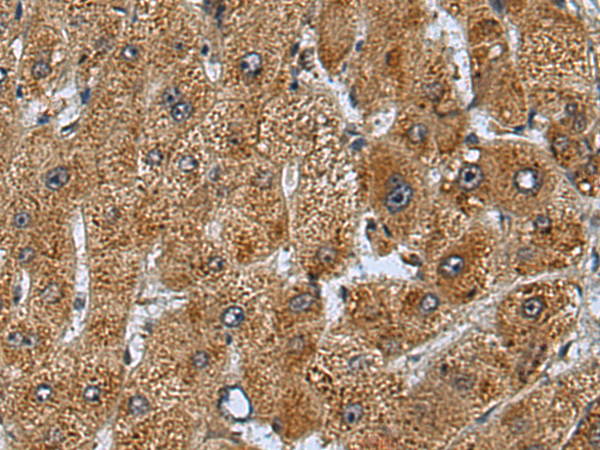
| WB | 咨询技术 | Human,Mouse,Rat |
| IF | 咨询技术 | Human,Mouse,Rat |
| IHC | 1/150-1/300 | Human,Mouse,Rat |
| ICC | 技术咨询 | Human,Mouse,Rat |
| FCM | 咨询技术 | Human,Mouse,Rat |
| Elisa | 1/5000-1/10000 | Human,Mouse,Rat |
| Host/Isotype | Rabbit IgG |
| Antibody Type | Primary antibody |
| Storage | Store at 4°C short term. Aliquot and store at -20°C long term. Avoid freeze/thaw cycles. |
| Species Reactivity | Human, Mouse, Rat |
| Immunogen | Fusion protein of human CLASP2 |
| Formulation | Purified antibody in PBS with 0.05% sodium azide and 50% glycerol. |
+ +
以下是关于CLASP2抗体的参考文献及其摘要概括:
1. **"CLASP2 interacts with p120-catenin to govern microtubule dynamics at adherens junctions"**
- **作者**: M. A. Stehbens et al.
- **摘要**: 研究通过免疫荧光和抗体标记发现,CLASP2与p120-catenin结合,调控细胞连接处的微管稳定性,影响上皮细胞迁移和极性维持。
2. **"Differential roles of CLASP1 and CLASP2 in the organization of kinetochore fibers"**
- **作者**: T. Maiato et al.
- **摘要**: 利用CLASP2抗体进行免疫染色,揭示其在有丝分裂中通过稳定动粒微管确保染色体正确排列,而CLASP1/2功能冗余但存在时空特异性差异。
3. **"CLASP2 regulates cortical microtubule orientation in neurons"**
- **作者**: E. T. Courchet et al.
- **摘要**: 通过抗体介导的蛋白质定位分析,发现CLASP2在神经元中调控皮层微管方向,影响轴突分支和突触发育,缺失导致神经形态异常。
4. **"CLASP2 expression correlates with colorectal cancer progression and predicts poor survival"**
- **作者**: S. Li et al.
- **摘要**: 采用CLASP2抗体进行免疫组化分析,发现其在结直肠癌组织中高表达,与肿瘤侵袭转移正相关,提示其作为预后标志物的潜力。
以上研究均直接使用CLASP2抗体进行功能或临床分析,涵盖细胞迁移、有丝分裂、神经发育及癌症机制等领域。
CLASP2 (cytoplasmic linker-associated protein 2) is a microtubule-associated protein critical for regulating cytoskeletal dynamics, cell polarity, and intracellular trafficking. It belongs to the CLASP family, which includes CLASP1 and CLASP2. both sharing conserved N- and C-terminal domains that mediate interactions with microtubules, actin filaments, and other regulatory proteins like CLIP-170. CLASP2 is particularly involved in stabilizing microtubules at specific subcellular regions, such as the cell cortex or growing microtubule plus-ends, and plays a role in mitosis, cell migration, and organelle transport. Its dysfunction has been linked to neurodevelopmental disorders, cancer metastasis, and compromised neuronal connectivity.
Antibodies targeting CLASP2 are essential tools for studying its localization, expression, and function. They are widely used in techniques like immunofluorescence, Western blotting, and immunohistochemistry to visualize CLASP2 distribution during cell division, neuronal development, or epithelial polarization. Many CLASP2 antibodies are raised against specific epitopes, such as the N-terminal coiled-coil region or C-terminal domains, ensuring specificity. Validated antibodies help elucidate CLASP2's role in diseases; for example, reduced CLASP2 levels correlate with impaired axonal guidance, while its overexpression in tumors may promote invasive behavior. Researchers often verify antibody specificity using knockout cell lines or siRNA knockdowns to minimize cross-reactivity with CLASP1. Commercial CLASP2 antibodies are available from multiple suppliers, with applications spanning basic cell biology to translational cancer research.
×